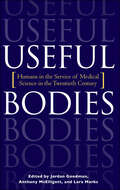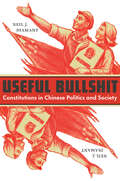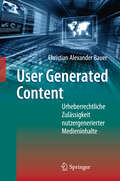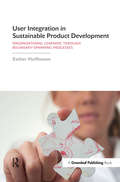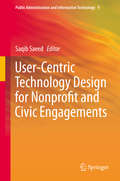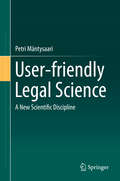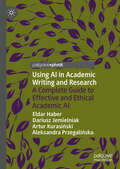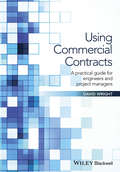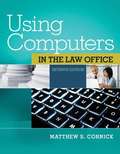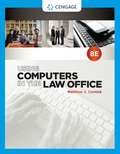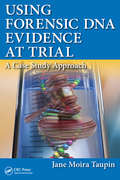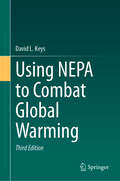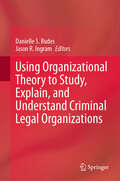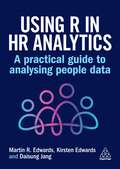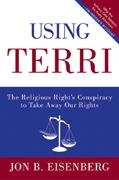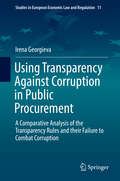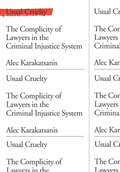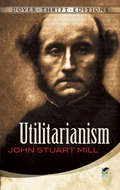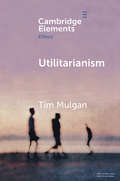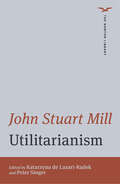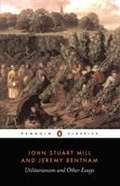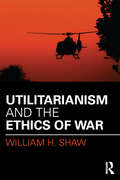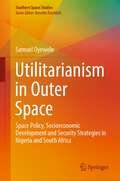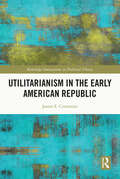- Table View
- List View
Useful Bodies: Humans in the Service of Medical Science in the Twentieth Century
by Jordan Goodman Anthony McElligott Lara MarksThough notoriously associated with Germany, human experimentation in the name of science has been practiced in other countries, as well, both before and after the Nazi era. The use of unwitting or unwilling subjects in experiments designed to test the effects of radiation and disease on the human body emerged at the turn of the twentieth century, when the rise of the modern, coercive state and the professionalization of medical science converged. Useful Bodies explores the intersection of government power and medical knowledge in revealing studies of human experimentation—germ warfare and jaundice tests in Great Britain; radiation, malaria, and hepatitis experiments in the U.S.; and nuclear fallout trials in Australia. These examples of medical abuse illustrate the extent to which living human bodies have been "useful" to democratic states and emphasize the need for intense scrutiny and regulation to prevent future violations.Contributors: Brian Balmer, University College London; Miriam Boleyn-Fitzgerald, University of Wisconsin; Rodney A. Hayward, University of Michigan; Joel D. Howell, University of Michigan; Margaret Humphreys, Duke University; David S. Jones, Massachusetts General Hospital; Robert L. Martensen, Tulane University School of Medicine; Glenn Mitchell, University of Wollongong; Jenny Stanton, London School of Hygiene and Tropical Medicine; Gilbert Whittemore, independent scholar/attorney, Boston
Useful Bodies: Humans in the Service of Medical Science in the Twentieth Century
by Jordan Goodman Anthony McElligott Lara MarksA collection of essays that offers “a significant contribution to our understanding of the role of the state in human subjects research” (Journal of the History of Biology).Though notoriously associated with Germany, human experimentation in the name of science has been practiced in other countries, as well, both before and after the Nazi era. The use of unwitting or unwilling subjects in experiments designed to test the effects of radiation and disease on the human body emerged at the turn of the twentieth century, when the rise of the modern, coercive state and the professionalization of medical science converged. Useful Bodies explores the intersection of government power and medical knowledge in revealing studies of human experimentation—germ warfare and jaundice tests in Great Britain; radiation, malaria, and hepatitis experiments in the U.S.; and nuclear fallout trials in Australia. These examples of medical abuse illustrate the extent to which living human bodies have been “useful” to democratic states and emphasize the need for intense scrutiny and regulation to prevent future violations.Contributors: Brian Balmer, University College London; Miriam Boleyn-Fitzgerald, University of Wisconsin; Rodney A. Hayward, University of Michigan; Joel D. Howell, University of Michigan; Margaret Humphreys, Duke University; David S. Jones, Massachusetts General Hospital; Robert L. Martensen, Tulane University School of Medicine; Glenn Mitchell, University of Wollongong; Jenny Stanton, London School of Hygiene and Tropical Medicine; Gilbert Whittemore, independent scholar/attorney, Boston“Each chapter is a startling case study that examines the nature and degree of the state’s involvement in human experimentation.” —Issues in Law and Medicine“Well written and meticulously researched.” —Journal of the History of Medicine and Allied Sciences
Useful Bullshit: Constitutions in Chinese Politics and Society
by Neil J. DiamantIn Useful Bullshit Neil J. Diamant pulls back the curtain on early constitutional conversations between citizens and officials in the PRC. Scholars have argued that China, like the former USSR, promulgated constitutions to enhance its domestic and international legitimacy by opening up the constitution-making process to ordinary people, and by granting its citizens political and socioeconomic rights. But what did ordinary officials and people say about their constitutions and rights? Did constitutions contribute to state legitimacy? Over the course of four decades, the PRC government encouraged millions of citizens to pose questions about, and suggest revisions to, the draft of a new constitution. Seizing this opportunity, people asked both straightforward questions like "what is a state?", but also others that, through implication, harshly criticized the document and the government that sponsored it. They pressed officials to clarify the meaning of words, phrases, and ideas in the constitution, proposing numerous revisions. Despite many considering the document "bullshit," successive PRC governments have promulgated it, amending the constitution, debating it at length, and even inaugurating a "Constitution Day."Drawing upon a wealth of archival sources from the Maoist and reform eras, Diamant deals with all facets of this constitutional discussion, as well as its afterlives in the late '50s, the Cultural Revolution, and the post-Mao era. Useful Bullshit illuminates how the Chinese government understands and makes use of the constitution as a political document, and how a vast array of citizens—police, workers, university students, women, and members of different ethnic and religious groups—have responded.
User Generated Content
by Christian Alexander BauerDas Web 2.0 hat zu einem Wandel des Nutzerverhaltens in Internet geführt: Immer mehr Nutzer gehen vom passiven Konsum über zu einem interaktiven Nutzungsverhalten. Bei einem Großteil der produzierten Beiträge greifen sie dabei auf fremde, zumeist urheberrechtlich geschützte Inhalte zurück. Vor diesem Hintergrund geht der Autor der Frage nach, inwieweit diese unautorisierte Verwendung fremder Werke und Leistungen urheberrechtlich zulässig ist und in welchem Umfang dieses Phänomen zukünftig vom Gesetzgeber privilegiert werden sollte.
User Integration in Sustainable Product Development: Organisational Learning through Boundary-Spanning Processes
by Esther HoffmannChanges in production and consumption patterns are a crucial element in advancing the sustainability agenda. Many companies are now contributing to such efforts through a focus on sustainable innovation when developing new products and services. However, problematically, many such products fail as consumers reject them in the marketplace. User integration in product development is a well-suited approach to increase the usability and the marketability of new products. This book asks the following question: under what conditions can companies trigger sustainability-oriented organizational learning processes by integrating consumers in product development? The author analyses this question by studying a new approach called INNOCOPE (Innovating through consumer-integrated product development). The analysis is based on a process model of organizational learning, distinguishing different learning phases and related boundary-spanning activities. The case study shows that boundary spanning and communication with external actors may directly affect almost all phases of the organizational learning process. Depending on the organizational learning phase, specific boundary-spanning activities are identified that can be characterized as outside-in, inside-in or inside-out directed processes. Moreover, the book describes supportive conditions for user integration with regard to the company, the product, the users involved and the communication process, and provides managerial recommendations. User Integration in Sustainable Product Development sheds new light on the interaction between companies and users in innovation processes and how they relate to sustainable product development. Its focus on organizational learning at and across the boundaries of companies is original, stimulating, improves our understanding of user–producer interactions and distinguishes the book from other publications on the market. The book provides a hugely comprehensive overview of user integration in innovation processes: its advantages, problems and weaknesses, and the methods in which it is currently applied. This, along with a systematic analysis of organisational learning provides the reader with a complete understanding of what has to be considered when studying user-producer interactions from a company perspective and provides the basis for further improvements and company strategies to advance the take-up of sustainable products. The book will be essential reading for academics and practitioners involved with organizational learning, innovation studies, sustainable design and product development, and marketing.
User-Centric Technology Design for Nonprofit and Civic Engagements (Public Administration and Information Technology #9)
by Saqib SaeedDue to the increased global political importance of the nonprofit sector, its technological support and organizational characteristics have become important fields of research. In order to conduct effective work, nonprofits need to communicate and coordinate effectively. However, such settings are generally characterized by a lack of resources, an absence of formal hierarchical structures and differences in languages and culture among the activists. Modern technologies could help nonprofit networks in improving their working. In order to design appropriate technological support for such settings, it is important to understand their work practices, which widely differ from traditional business organizations. This book aims to strengthen the body of knowledge by providing user studies and concepts related to user centered technology design process for nonprofit settings. The examination of ethnographic studies and user centered evaluation of IT artifacts in practice will further the understanding of design requirements of these systems. This book includes chapters from leading scholars and practitioners on the technology design process examining human centered factors. The chapters will focus on developed and developing countries as they both have unique issues in technology design. The book will be useful or of interest to academics from a range of fields including information systems, human computer interaction, computer supported cooperative work and organizational science as well as for government officials and governmental organizations.
User-friendly Legal Science
by Petri MäntysaariThis book defines the characteristics of a new discipline that is both legal and scientific: user-friendly legal science.Focusing on how legal tools and practices can be used to achieve objectives in different contexts, it offers an alternative to doctrinal research, law-and-something disciplines, and the traditional interdisciplinary approach.The book not only defines the new discipline’s research approach, point of view, theory-building, and research methods, it also shows how it relates to other scientific disciplines and how existing doctrinal legal disciplines can be upgraded into scientific disciplines.
Using AI in Academic Writing and Research: A Complete Guide to Effective and Ethical Academic AI
by Dariusz Jemielniak Eldar Haber Aleksandra Przegalińska Artur KurasińskiThis book comprehensively explores how AI tools can revolutionize academic writing, research, grant proposals, and educational practices. With a focus on practical applications, ethical considerations, and future trends, the book serves as an indispensable roadmap for academics, researchers, and educators eager to integrate AI into their work. Whether you're looking to enhance your research capabilities, craft compelling grant proposals, personalize learning experiences, or lead your institution into the future, this book provides the insights and tools necessary to navigate and shape the AI-enhanced landscape of academia. It demonstrates how to redefine scholarly work with cutting-edge AI innovations through real-life, practical examples, yet keeping the level of generalization high enough to keep it relevant for a few years. By balancing specific, actionable insights with broader perspectives, this book equips readers to not only adapt to but actively influence the evolving role of AI in higher education, research, and funding acquisition, ensuring its value as a resource both now and in the coming years.
Using Commercial Contracts: A Practical Guide for Engineers and Project Managers
by David WrightUsing Commercial Contracts: a practical guide for engineers and project managers examines how the law of contract operates, and the way in which the legal system interprets what a contract actually means. By giving clear, readable and expert advice on key legal issues, this guide provides the manager and engineer with an easily understandable and practical approach to the laws of contract.
Using Computers in the Law Office (Seventh Edition)
by Matthew S. CornickUsing Computers in the Law Office, Seventh Edition, is designed to give students both theoretical understanding and practical experience with common law-office computer applications. These include both widely used applications, such as Microsoft Word, Excel, PowerPoint, and HotDocs; and programs specific to the law office, such as Tabs3, AbacusLaw, Clio, Discover FY, CaseMap, TimeMap, Westlaw, Lex-isNexis, and TrialDirector.
Using Computers in the Law Office,
by Matthew S. CornickUSING COMPUTERS IN THE LAW OFFICE, Eighth Edition, provides comprehensive coverage of computer concepts, including the latest versions of common programs like Microsoft Word, Excel, and PowerPoint, and specialized applications such as Case Map, Clio, Hot Docs, Time Map, and Trial Director.
Using Forensic DNA Evidence at Trial: A Case Study Approach
by Jane Moira TaupinUsing Forensic DNA Evidence at Trial: A Case Study Approach covers the most common DNA analysis methods used in criminal trials today, including STR techniques, mitochondrial DNA, and Y-STRs. It presents some novel techniques—including familial testing and analyzing domestic animal hair—that have been recently introduced in unique cases, each of which is outlined in detail. It also illustrates special issues related to forensic DNA evidence by using court proceedings such as trials and appeals, commissions of inquiry, and government and laboratory reviews. With forensic DNA analysis becoming increasingly important at trial, the lively and sometimes bizarre cases presented in this book have been carefully chosen to highlight specific concepts, methods, and interpretations used in DNA analysis. Sections throughout examine the nature of expertise with a special focus on the role of subjectivity in the interpretation of forensic DNA evidence, emphasizing cognitive bias and extraneous context. Using both convictions and exonerations as examples, the book also discusses the strengths and limitations of DNA evidence and testing. The book is written in an accessible manner for the non-scientific reader, such that criminal lawyers, judges, and forensic experts will all understand the nature of analysis and application of DNA evidence in a variety of court cases. Extensive references—including notable trial proceedings, cross references of cases, and specific forensic statistics—round out the book and help to provide a complete understanding of forensic DNA analysis and its current usage in the courtroom.
Using NEPA to Combat Global Warming
by David L. KeysThis book will help policy makers, university students, and the general public understand how the National Environmental Policy Act (NEPA) is intended to work, and how it can be used to reduce greenhouse gas (GHG) emissions in order to combat global warming. Unlike all other books on NEPA, this book focuses on the global warming problem in terms of thermodynamics and entropy. It explains how NEPA can help combat global warming by operationalizing the “energy requirements and conservation potential” analysis requirement in the Council on Environmental Quality (CEQ) regulations, 40 CFR 1502.16 (a)(7), and it puts the past, present, and future of the NEPA statute, the CEQ regulations, and energy analysis requirements all in one easy to find, portable place. It will be an excellent resource for university students and teachers, policy analysts, and those members of the public that want to know all about the NEPA Process. As a third edition, the book contains new analysis on the amended NEPA statute (2023) and revised CEQ regulations (2024), CEQ’s January 9, 2023 interim guidance on how to incorporate GHG emissions into NEPA documents, the social costs of carbon, the long-term strategy of the United States to get to net-zero GHG by 2050, assessing climate risk in NEPA reviews, and the link between energy requirements analysis required by 40 CFR 1502.16 (a) (7) and reduced GHG emissions.
Using Organizational Theory to Study, Explain, and Understand Criminal Legal Organizations
by Danielle S. Rudes Jason R. IngramThis book explicitly and intentionally uses organizational theory concepts and ideas to examine key issues in the criminal legal realm. Addressing some of the many organizational theories, this volume examines a variety of approaches and theoretical frameworks to explore and explain challenges that are both presented to and faced by the criminal legal system and the individuals served by or working within it. This volume is divided into two parts: organizational theories and organizational concepts and ideas. Within these parts, individual chapters provide readers with new lenses or frameworks for considering criminal legal organization, including one that involves organizational theoretical explanations for how and why criminal legal organizations and their staff and workers operate in these critically salient spaces. The book concludes with a chapter that outlines important considerations for anyone seeking to learn or teach organizational theory as a way of explaining or understanding criminal legal organizations. Additional reading suggestions and two sample syllabi are provided. The book is ideal for criminal justice and criminology undergraduate and graduate students, but is also relevant to individuals considering criminal legal organizations in courses in sociology, law and society, and organizational behavior.
Using R in HR Analytics: A Practical Guide to Analysing People Data
by Dr Martin Edwards Kirsten Edwards Daisung JangConfidently analyse your organization's HR data using R and R Studio to gain insights that improve people strategy and business decision-making. Effective use of HR data has the power to transform a business. However, this is only possible if HR practitioners have the knowledge, skills and confidence to analyse the data and to draw evidence-based insights from it. This book is the practical guide that HR professionals need. Through worked examples, this book shows readers how to carry out and interpret analyses of HR data in areas such as recruitment, performance, employee engagement and diversity. People professionals are then shown how to use the results to develop robust people strategies and to support more effective evidence-based decision-making. Using R in HR Analytics provides a thorough grounding in the differences between descriptive reporting and predictive analytics as well as the methods and measures used to identify the validity of results. There is also expert guidance on the role of artificial intelligence, machine learning and large language modelling on HR analytics. Written for HR professionals at any level, there is essential coverage of data privacy and the ethical considerations of using people data. Online resources include sample datasets to allow readers to practice analysing HR data.
Using Terri: The Religious Right's Conspiracy to Take Away Our Rights
by Jon B. EisenbergThe Terri Schiavo case centerred around the removal of a feeding tube from a dying woman. Eisenberg, who served as one of the lead attorneys on Michael Schiavo's side, asserts that the Terri Schiavo case was a key battle in a larger political struggle over abortion, stem-cell research, physician-assisted suicide, gay rights, and the appointment of federal judges. The religious Right chose to make it a national spectacle because they thought they could win. They were wrong. But there are many more battles to come. Jon Eisenberg, who served as one of the lead attorneys on Michael Schiavo's side, exposes the religious Right's strategies and follows the money trail to reveal how they are organized, who is funding the movement, and where we can expect future legal maneuvers to combat the American traditions of autonomy and freedom. Jon Eisenberg has experienced the family struggle of removing a feeding tube from a loved one and witnessed firsthand the Florida drama that will continue to have national legal and political consequences for years to come. What tactics can we expect to see in courtrooms and state legislatures all across this country in the days ahead? Who is behind the funding and what do they hope to accomplish and when? What are the religious and bioethical issues that are at the center of these debates and how will they affect future legal battles? Using Terri gives us a behind-the-scenes look at what happened -- and what's coming. Author Info. Jon B. Eisenberg teaches appellate procedure at the University of California's Hastings College of the Law in San Francisco.
Using Transparency Against Corruption in Public Procurement
by Irena GeorgievaThis book examines corruption in public procurement in three Member States of the EU, reviewing their different approaches to combating corruption, and the extent to which the transparency principle is applied in their procurement systems. The focus of the work is on the contrast between the unsuccessful procurement legislation of a relatively young Member State (Bulgaria) and its attempt to curb corruption by expanding the scope of application of the transparency principle, and two examples of procurement systems where corruption is limited adequately, without an excess of information procedural requirements (Germany and Austria). The book scrutinizes the transparency rules, procurement participants, and responsible institutions in the award of procurements in these countries. It discusses in detail the types of infringements involving corruption as well as their link to infringements of the transparency principle. It compares and examines the systems of control and appeal against a contracting authority's actions within the various legislative schemes, and highlights the legislative weaknesses which fail to reduce corruption. The comparative analysis between the Bulgarian public procurement system and the German and Austrian systems is carried out through detailed research not only with regard to adherence to the transparency principle, but also to the use of other mechanisms to limit corruption, insofar as these solutions are appropriate and could be adapted in other countries currently lacking sufficient anti-corruption measures.
Usual Cruelty: The Complicity of Lawyers in the Criminal Injustice System
by Alec KarakatsanisAlec Karakatsanis is interested in what we choose to punish. For example, it is a crime in most of America for poor people to wager in the streets over dice; dice-wagerers can be seized, searched, have their assets forfeited, and be locked in cages. It's perfectly fine, by contrast, for people to wager over international currencies, mortgages, or the global supply of wheat; wheat-wagerers become names on the wings of hospitals and museums.
Utilitarianism
by John Stuart MillHow do we decide what is "good" and what is "bad"? According to the ethical theory of Utilitarianism, to do good is to "always perform that act, of those available, that will bring the most happiness or the least unhappiness." By far the most widely read introduction to this theory, John Stuart Mill's Utilitarianism is one of the most important and controversial works of moral philosophy ever written.In this major contribution to ethical history, Mill's treatise defends the view that all human action should produce the greatest happiness overall, and that happiness itself is made up of "higher pleasures," such as the cultural, intellectual, and spiritual, and "lower pleasures," such as the physical. The relationship of utilitarian theory to other ethical systems, and powerful arguments in its favor--especially when concerning justice--are brilliantly discussed. How do we weigh options to maximize happiness for self and for those around us? From common-day dilemmas to large-scale social decisions, this exposition remains as relevant today as it was to intellectual and moral dilemmas of the nineteenth century.
Utilitarianism (Elements in Ethics)
by Tim MulganMoral theories can be distinguished, not only by the answers they give, but also by the questions they ask. Utilitarianism's central commitment is to the promotion of well-being, impartially considered. This commitment shapes utilitarianism in a number of ways. If scarce resources should be directed where they will best promote well-being, and if theoretical attention is a scarce resource, then moral theorists should focus on topics that are most important to the future promotion of well-being. A theme of this Element is that, as times change, the priorities (both practical and theoretical) of utilitarianism also change. Questions that were once theoretical curiosities move centre stage. And themes from earlier utilitarians that have become unfashionable may come to the fore again. Utilitarianism is a living tradition, not an abstract set of timeless principles or a purely historical artefact.
Utilitarianism (The Norton Library #0)
by John Stuart MillAbout Utilitarianism Edited by Katarzyna de Lazari-Radek and Peter Singer, “the acknowledged heirs of the founders of utilitarianism” (Jeff McMahan), the Norton Library edition of Utilitarianism features the complete text of the seventh (1879) edition, preceded by a thorough introduction to the work’s historical and intellectual contexts. Extensive endnotes clarify obscure terms and provide detailed analysis of the most philosophically significant passages, helping students to understand and critically engage with “the most famous defense of the utilitarian view ever written” (Geoffrey Scarre).
Utilitarianism and other Essays
by J. S. Mill Jeremy BenthamHundreds of bold, imaginative men--celebrities as well as everyday heroes--share here their most intimate desires, deepest fears, and most fervent cravings for renewal. Decade by decade, Sheehy uncovers the real issues facing men today: finding new passion and purpose to invigorate the second half of their lives, dealing with "manopause," surviving job change, enjoying post-nesting zest, defeating depression, and learning what keeps a man young.
Utilitarianism and the Ethics of War (War, Conflict and Ethics)
by William H. ShawThis book offers a detailed utilitarian analysis of the ethical issues involved in war. Utilitarianism and the Ethics of War addresses the two basic ethical questions posed by war: when, if ever, are we morally justified in waging war, and if recourse to arms is warranted, how are we permitted to fight the wars we wage? In addition, it deals with the challenge that realism and relativism raise for the ethical discussion of war, and with the duties of military personnel and the moral challenges they can face. In tackling these matters, the book covers a wide range of topics—from pacifism to armed humanitarian intervention, from the right of national defense to pre-emptive or preventive war, from civilian immunity to the tenets of just war theory and the moral underpinnings of the rules of war. But, what is distinctive about this book is that it provides a consistent and thorough-going utilitarian or consequentialist treatment of the fundamental normative issues that war occasions. Although it goes against the tide of recent work in the field, a utilitarian approach to the ethics of war illuminates old questions in new ways by showing how a concern for well-being and the consequences of our actions and policies shape the moral constraints to which states and other actors must adhere. This book will be of much interest to students of the ethics of war, just war theory, moral philosophy, war and conflict studies and IR.
Utilitarianism in Outer Space: Space Policy, Socioeconomic Development and Security Strategies in Nigeria and South Africa (Southern Space Studies)
by Samuel OyewoleThis book showcases Nigerian and South African experiences on space politics, policy and strategy vis-à-vis their development and security aspirations, while contributing to the broader African and the Global-South perspectives on the subject. Space policy in developing countries such as Nigeria and South Africa is motivated by utilitarian promises that space and the attendant technologies have the potential to advance development and security interests of the affected nations. However, several decades into the orbital journey of these countries, little is known of their space politics, policies, strategies, capacities and capabilities, and realisation of desired objectives. Beyond pure and applied sciences reductionism, this book offers social science perspectives on space studies in Africa, as it examines the intricate relationships of historical, geographical, social, demographic, economic, political, administrative, and strategic factors, nationally, regionally and globally that have shaped research and development of space science and technologies, and their benefits, in Nigeria and South Africa.
Utilitarianism in the Early American Republic (Routledge Innovations in Political Theory)
by James E. CrimminsIn Utilitarianism in the Early American Republic James E. Crimmins provides a fresh perspective on the history of antebellum American political thought. Based on a broad-ranging study of the dissemination and reception of utilitarian ideas in the areas of constitutional politics, law education, law reform, moral theory and political economy, Crimmins illustrates the complexities of the place of utilitarianism in the intellectual ferment of the times, in both its secular and religious forms, intersection with other doctrines, and practical outcomes. The pragmatic character of American political thought revealed—culminating in the postbellum rise of Pragmatism—stands in marked contrast to the conventional interpretations of intellectual history in this period. Utilitarianism in the Early American Republic will be of interest to academic specialists, and graduate and senior undergraduate students engaged in the history of political thought, moral philosophy and legal philosophy, particularly scholars with interests in utilitarianism, the trans-Atlantic transfer of ideas, the American political tradition and modern American intellectual history.
